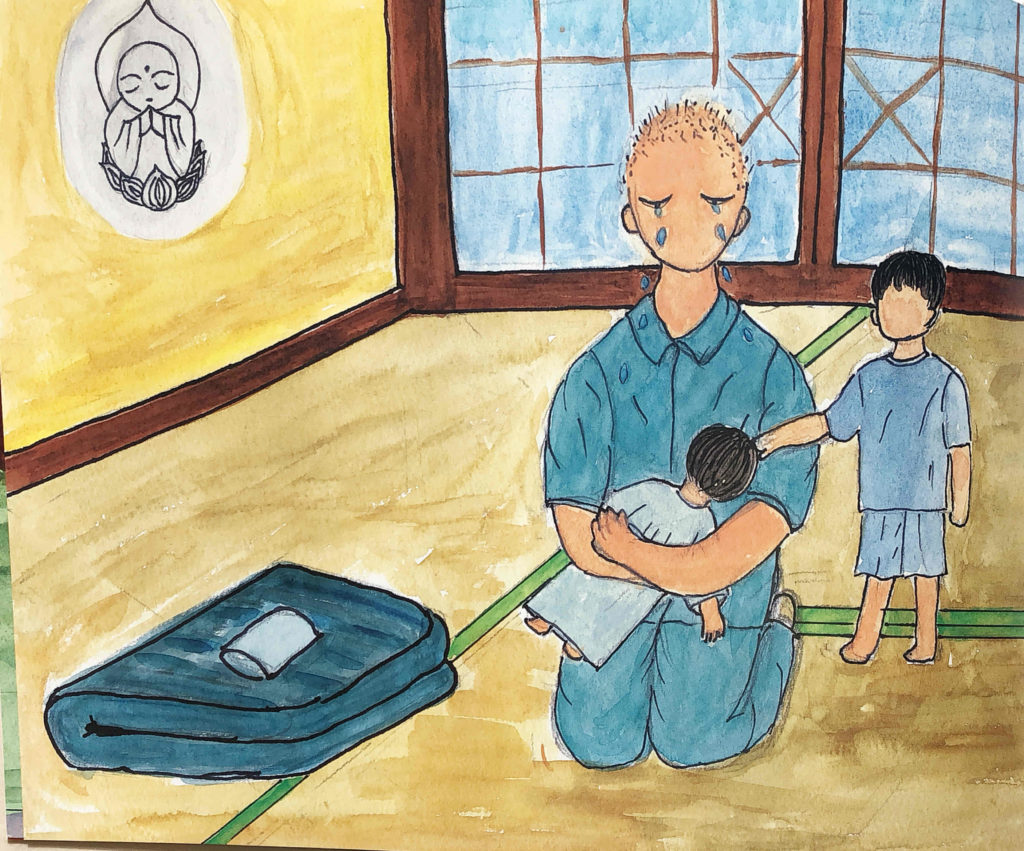Kiyomi Kono
I can’t forget, and we must never forget.
5. My Family Afterwards
One week after the A-bombing, Sumiko and her baby came back to our house. The night of the A-bombing, her family slept out by the waterside in Moto-Ujina, worrying about another air attack. Her baby boy already had malnutrition because of the food shortage and had to stay outside at night. Finally, he contracted pneumonia. As he breathed with difficulty when he lay down, Sumiko cuddled him all the time. Sumiko also lost her hair and had bleeding gums because of radiation. Still, she sat, cuddling her baby night and day. But on August 18, he died on her lap. Sumiko, who got thin and cuddled her baby 24 hours a day in a mosquito net, looked like a ghost.

Sumiko was weakened by diarrhea and anemia, and stayed in our house for one year until she recovered. Her husband was injured all over his body and took sick leave for one year. He also stayed in our house for recuperation for six months.
Midori was sent to Ninoshima Island, where the office manager of Red Cross Hospital came with clothes to bring her back a few days later. As many medical staff had died, the hospital needed anyone who could work. Midori went back to work there, but my father was worried
about her and brought her home. She got thin because of the aftereffects of dysentery. In November, however, the hospital asked her again to come back. My father opposed her return to work because she didn’t recover fully, but she went back to the hospital with a sense of responsibility.
Toshikatsu had volunteered to be a career soldier at 18 and joined the battles in Middle China, South China, North China, the Malay Peninsula, and New Guinea. He developed malaria in New Guinea and was sent to a hospital in the Philippines. After the war, he was taken prisoner of the US military and demobilized the next year. One day, my father found him on the street, and they threw themselves into each other’s arms and wept. After he came home, he sometimes had convulsions due to the aftereffects of malaria. My mother put a futon on him and got on it to hold him down. It was not easy for him to get a job because former soldiers were a nuisance. Even if he got a job, he could not get rid of the soldier mentality and work for a company for a long time. He changed jobs frequently.
Toshikatsu had a promise of a marriage with a nurse whom he met in the hospital in the Philippines. She was from the Izu Peninsula in Shizuoka Prefecture. Because he could not set out on a long trip, my father went to Shizuoka, met her family and came back to Hiroshima with her. I think she had a very hard time, because she came all the way to the countryside where she had no acquaintances. In those days in my area, taking a woman as a wife meant getting a worker for the family. Women were taken as the workforce.